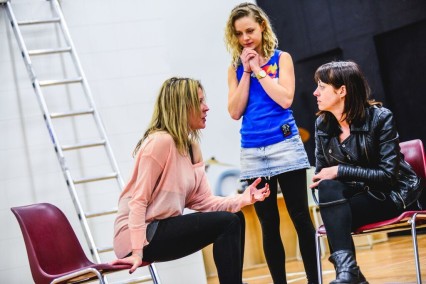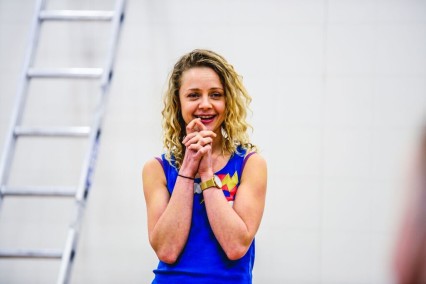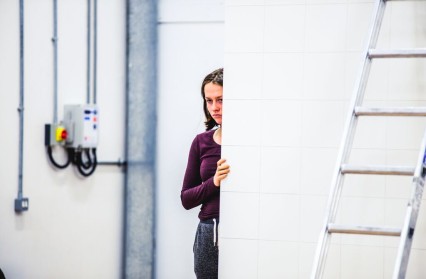Award-winning playwright Katherine Chandler writes about the process of her new play, Bird, from idea to the stage at Sherman Cymru.
I wrote ‘Bird’ in a grey breeze block office in the National Theatre Studio. It was perfectly bare isolation for the play. I used the walls like a pinboard and papered newspaper clippings and photos of Wales and murmurations and huge sheets of A1 with arrows and character descriptions and story links and plots. When I’d finished, it looked like a murder squad room.

I had the characters very clearly in my head. I worked for some time back in 2009/2010 with a group of young people in Bridgend who were facing housing issues. Some were leaving the care system, most had disrupted family backgrounds, a lot were sixteen and seventeen with very little support and increasingly vulnerable because of their need to get through the day and to survive. My time spent with them felt very present, there was a limited look towards any future.
Because of that time I became interested in stories in the news about the care system and I saw a story about an inquest into the deaths of two young girls from a care home in Scotland. The inquiry into the double suicide severely criticised the care home where they lived for failing to protect them from harm. Among a series of breaches of rules and procedures, the inquiry discovered a fire alarm had been cut off because the girls were repeatedly using the door to leave the building and the alarm was disturbing staff. The inquiry ruled they should have been accommodated in a more secure unit on the first floor, of the care home.
I imagined their families, their backgrounds, where they spent their time, who they talked to, what were their lives? How do you get to that choice at that age?
I have a huge loving, warm family, that were and are, an enormous, safe, comfort blanket. I thought a lot about that and about what might have happened if I hadn’t had the foundations of family that I had.
The inquiry was all over the papers a few months before my time in the National Theatre Studio. I wanted to use my time in there to complete a first draft of a play. On my journeys to London and back, I was reading a lot of newspapers and a prominent story was the Rochdale grooming case. I read a lot about it at that time and about some of the victims.

Somewhere in my first week or so at the Studio the two worlds came together and I had the beginnings of what would become Bird. I had a very strong image in my head of a murmuration on a cliff where my two girls would play, it felt like a place that they could be free, children. That image became the start and the end of the play. I wrote those two scenes with limited dialogue, trying to get on the page what was in my head, the feel of the huge, overpowering, expanse of nature and the world from the edge of a tempestuous Welsh cliff.
Over the following few weeks I managed to write the bit inbetween those two scenes and by the end of my attachment at the studio, I had a rough first draft.
After reading the draft the studio asked me if I’d like to come back and have some time with a director and actors to hear the work. I did and on the back of what I learnt in that week I wrote the second draft, losing a character on the way.
I was on to other projects soon after my attachment and so Bird was filed and forgotten for a while. In a very brief moment, at a very busy time for me, I read something on twitter about the Bruntwood prize for playwriting and in that moment I entered Bird.
Winning the Bruntwood judges prize was a huge moment for the play. Soon after the announcement I met with the Royal Exchange to discuss the plays future and so began the development.
Over the following three years the play changed with each draft but the heart of the play remained the same. Bird doesn’t necessarily have a beginning, middle and end but for production it had to know itself as a play and be confident in what it was saying. I changed the play from having two protagonists into one with a stronger journey. My plays don’t always conform structurally and for this one I wanted some tones of expressionism and folklore. I love the way ordinary people tell extraordinary stories. I used to find the way my grandparents told stories very comforting and ritualistic and I wanted to use that within the play.
With every draft were thoughts of the young people in Bridgend and two girls from Scotland.
It feels like a long time since I wrote the first draft over three years ago. The script retains the image of the edge of a tempestuous Welsh cliff that was my start and end point and if I think of Bird that’s where I go in my mind.












